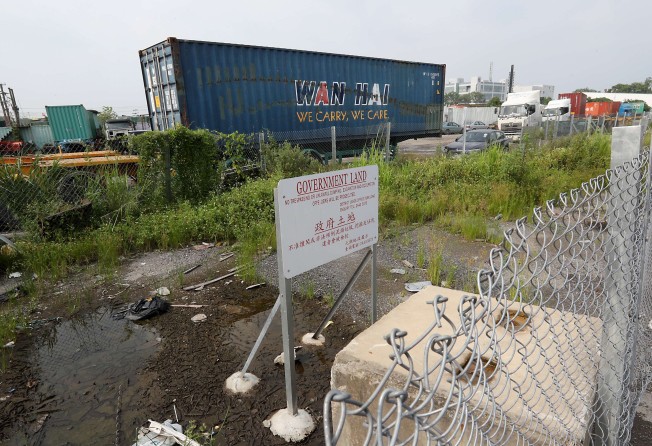Hong Kong begins crackdown on short-term rentals of vacant illegally occupied land
Government’s landmark policy change effective immediately

The government will no longer turn a blind eye to short-term rental contracts on vacant land as part of a crackdown on illegal occupation, according to a landmark policy change by the Lands Department.
Owners of private land in the New Territories, many of which are brownfield sites or damaged agricultural areas, often extend their operations of car parks and container storages into vacant neighbouring public land.
For years, the government has tolerated the practice by allowing landlords to file regularisation applications, enabling the authorities to legally lease such land.
However, the government will no longer accept new applications to convert illegally occupied land from Tuesday onwards into short-term rental agreements, and offenders could face prosecution, a department statement said.
For unlawful occupation of government land that occurred before March 28, the department will still consider applications.
“These short-term tenancies are a kind of encouragement for people to occupy land illegally,” lawmaker Edward Yiu Chung-yim said.
“Even if they got caught, they could continue to occupy the land as long as they paid rent for it.”
“This [change] will lower the incentive for illegal occupation. It’s something we have successfully fought for.”
Yiu and fellow lawmaker Eddie Chu Hoi-dick have been vocal in pushing the government to review its policy after revelations that officials had approved short-term tenancy for illegally occupied sites tied to a controversial housing project in Wang Chau in the New Territories.
Government officials were accused by lawmakers in September of colluding with rural leaders who illegally occupied parts of brownfield sites for their businesses. Officials had scaled down plans to build 17,000 public housing units on brownfield sites and opted to build 4,000 flats on a nearby green belt site.
One in three applications to convert illegally acquired government land into legal short-term leases was approved by the government, according to official statistics in September.
The new policy would tighten vetting procedures for existing applications and new applications for cases that occurred before March 28.
Changes include shortening the processing time to three weeks, and requiring an advance payment of 12 months’ rent for accepted applications.
Owners who seek to renew their short-term rental contracts when they expire will not be affected.
Lengthy application and approval processes – sometimes taking nearly four years – meant owners would continue to illegally occupy land and profit from their businesses, an Ombudsman report last September found.
This is going to be a waste of land resources
Shap Pat Heung rural committee chairman Leung Fuk-yuen warned the government would have to deal with the consequences of a new policy change.
“This is going to be a waste of land resources, and in the end the government will have to use taxpayer’s money for upkeep of the unused land,” he said.
“Did they really think this through?”
Yiu and Chu both said the government still had a long way to go in terms of ensuring land resources in the New Territories were being used efficiently.
“This policy change can only solve part of the land use problem,” Chu said. “The government should resume brownfield sites, reorganise land ownership to improve land use efficiency so there will be no need for owners to illegally occupy any land.”